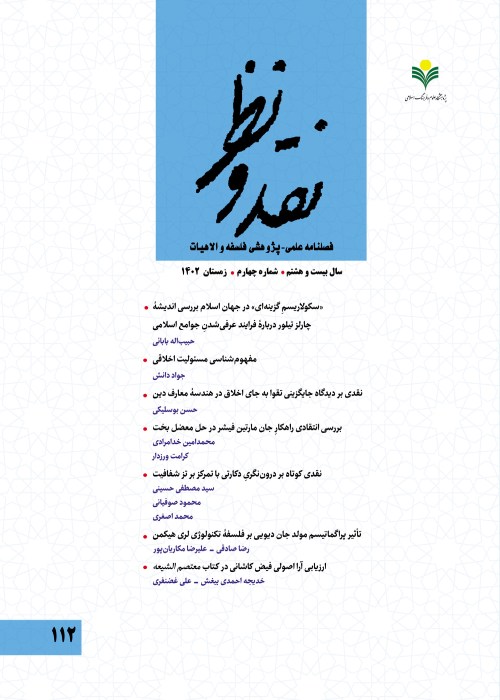Fore-Conception of Completeness: A Necessary Condition for Understanding and Misunderstanding for Gadamer
Author(s):
Article Type:
Research/Original Article (دارای رتبه معتبر)
Abstract:
This paper aims to investigate the requirement of the fore-conception of completeness as a necessary condition for understanding and misunderstanding inGadamer’s view. To do so, we deploy the analytic method. By the “fore-conception of completeness” Gadamer refers to the temporary assumption of an interpreter in reading a text, which consists of two elements: a formal (internal unity and consistency) and material (being a complete truth). He maintains that the understanding of a text begins with the projection of the initial meaning given to it by the interpreter. However, if the hermeneutic circle does not come to play with an appropriate fore-meaning, then the act of understanding will fail. For in this case the fit between the interpreter’s fore-meaning and the text will be doubtful. Thus, when a text is read, the first necessary assumption to correct, disaffirm, or confirm the interpreter’s initial fore-meaning will be that of the text’s unity and internal consistency. However, this assumption is not sufficient. It is necessary for the interpreter to temporarilyassume the complete truth of the text in order to test his or her fore-meaning and prejudices, because if the interpreter tries to understand the details of a text merely with an assumption of its coherence, then it will be impossible for those details to reveal the falsity of the limited and distorted initial meaning. The fore-conception of completeness is a “revocable” assumption of the authority of the text, which challenges the interpreter’s prejudices as well as arbitrary and personal lines of thought and is preparatory for their correction or affirmation. The fore-conception of completeness is a prerequisite of understanding, which is worthy of investigation, because every interpreter anticipates the completeness of the text in his or her attempt to understanding, in order to avoid inappropriate, arbitrary, and subjectivist interpretations by drawing upon the conflict between the anticipated meaning and the resistance of the text.
Keywords:
Language:
Persian
Published:
Journal of Philosophy & Theology, Volume:23 Issue: 4, 2019
Pages:
79 to 103
magiran.com/p1941994
دانلود و مطالعه متن این مقاله با یکی از روشهای زیر امکان پذیر است:
اشتراک شخصی
با عضویت و پرداخت آنلاین حق اشتراک یکساله به مبلغ 1,390,000ريال میتوانید 70 عنوان مطلب دانلود کنید!
اشتراک سازمانی
به کتابخانه دانشگاه یا محل کار خود پیشنهاد کنید تا اشتراک سازمانی این پایگاه را برای دسترسی نامحدود همه کاربران به متن مطالب تهیه نمایند!
توجه!
- حق عضویت دریافتی صرف حمایت از نشریات عضو و نگهداری، تکمیل و توسعه مگیران میشود.
- پرداخت حق اشتراک و دانلود مقالات اجازه بازنشر آن در سایر رسانههای چاپی و دیجیتال را به کاربر نمیدهد.
In order to view content subscription is required
Personal subscription
Subscribe magiran.com for 70 € euros via PayPal and download 70 articles during a year.
Organization subscription
Please contact us to subscribe your university or library for unlimited access!


